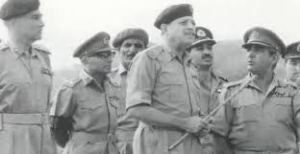1st. Phase

Pakistan came in to existence in 1947 and after 11 years came the 1st. phase of a country to enable its people better living and as a nation having a balanced Foreign Policy. Muhammad Ayub Khan, widely known as Ayub Khan, was the President of Pakistan from 1958 to 1969. Ayub Khan assumed power through using the extant government's power to assume political control of a country in 1958 and became the country's first Chief Martial Law Administrator. He resigned in 1969. Ayub's practically declared policy was an alliance with the United States during the Cold War, joining CENTO, and allowing the U.S. and Britain access to facilities inside Pakistan, most notably the airbase outside of Peshawar, from which U-2 intelligence flights over the Soviet Union were launched. He also strengthened military ties with neighbouring China, while relations deteriorated with the Soviet Union and India. There was the five-week war in 1965 with India, ending in a United Nations-mandated ceasefire. Domestically, Ayub embraced private-sector industrialisation and free-market principles, making the country one of Asia's fastest-growing economies. He built several infrastructure projects, including canals, dams and power stations, began Pakistan's space program, and gave less priority to nuclear deterrence.
At the beginning this phase was quite harshly active which brought a rapid positive change and majority of the people were happy despite fear of severe military measures because of the relief in daily utility prices and elimination of polluted edible items. The working attitude switched over to efficient one and overall productivity throughout the country improved. But with the passage of time relaxed mindset started popping up, a built-in feature of the nation unfortunately.
2nd. Phase
Zulfiqar Ali Bhutto was the ninth Prime Minister of Pakistan and its fourth President. He founded the Pakistan People's Party and served as its chairman until his execution in 1979. Educated at USC, UC Berkeley and Oxford, Bhutto trained as a barrister at Lincoln's Inn in London.
Bhutto was handed the presidency in December 1971 and an emergency was imposed. By July 1972, President Bhutto had recovered around 93,000 prisoners of war and 5,000 square miles of Indian-held territory after signing the Simla Agreement with Indian premier Indira Gandhi. In foreign affairs, he strengthened ties with Soviet Union, China and Saudi Arabia, and recognised the sovereignty of Bangladesh. Domestically, Bhutto's reign saw parliament unanimously approve a new constitution in 1973. He also played an integral role in initiating the atomic–bomb programme. His economic program was based on the nationalisation of much of Pakistan's fledgling industries, health care, and educational institutions. On 5 July 1977, chief of army staff General Zia-ul-Haq deposed Bhutto in a bloodless coup, and had the former Prime Minister controversially tried and executed by the Supreme Court in 1979 for authorising the murder of a political opponent. Bhutto aided his president in negotiating the Indus Water Treaty in India in 1960 and next year negotiated an oil-exploration agreement with the Soviet Union, which agreed to provide economic and technical aid to Pakistan. Bhutto was a Pakistani nationalist and socialist, with particular views on the type of democracy needed in Pakistan. On becoming foreign minister in 1963, his socialist viewpoint influenced him to embark on a close relationship with neighbouring China. His leadership style and his swift rise to power brought him national prominence and popularity. Bhutto and his staff visited Beijing and were warmly received by the Chinese, and Bhutto greeted Mao Zedong with great respect. There, Bhutto helped Ayub negotiate trade and military agreements with the Chinese regime, which agreed to help Pakistan in several military and industrial projects.
The charter of the party was very appealing as below poverty level majority was given assurance of providing food, clothing and housing and the promised policy implemented to some extent which was sabotaged by the opposition parties through fraudulent activities. Strict actions of Mr. Bhutto against his own party workers resulted in a chaos
3rd. Phase
General Raheel Sharif, NI, HI, is a four-star rank army general and the current Chief of Army Staff of the Pakistan Army, in office since 2013.
As the Inspector General for Training and Evaluation, he enhanced the military colleges in the country and provided unconventional training to the troops. He also deals with the evaluation of military doctrines and war strategies with a view to shaping future training programs. He changed the army's focus more towards carrying out counter-insurgency operations against Taliban militants.
Sharif has played an important role in convincing other senior officers in the army that the Tehrik-e-Taliban Pakistan (TTP) and assorted militants inside Pakistan are as much of a threat as India. However, Sharif stressed that all possible threats will be dealt with accordingly, be it internally or externally. According to The Economist, "Unlike his predecessors, General Sharif appears to see jihadists, principally in the form of Pakistan’s own Taliban, as the country’s greatest threat, and has sought the help of the Americans in countering it.
His commitment, devotion and loyalty has revived the the respect, honor and distorted image has quickly been reshaped as The Best Institution of the country not only domestically but also being seen by the international community as a whole. The nation gauges his bravery on top and great hopes are being estimated thereby to regain best ever image of the country.











